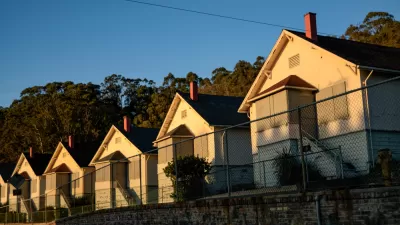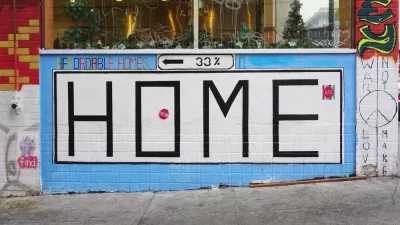Tired of not closing deals to preserve affordable housing due to delays in public financing, the nonprofit Housing Partnership Network created a real estate investment trust. The results have been "game changing."
Pam Fessler studies the example of the Housing Partnership Network, a coalition of housing nonprofits that created a real estate investment trust (REIT) to become more competitive in the housing market.
Dependent on government bond issues and housing tax breaks to pay for projects created a typical problem, according to Chrsistopher LoPiano, VP of Community Preservation and Development Corp., an affordable housing nonprofit in the Washington, D.C., area and Virginia "What we're not competitive on is closing quickly," says Lopiana in Fessler's report, "because we're dependent upon public financing, and public financing just takes longer."
"So...the Housing Partnership Network, decided it was time to get creative — to do what private investors have done for decades. They became the first nonprofits to form what's called a real estate investment trust, or REIT."
"The nonprofit groups figured they could offer potential investors a modest return on their money — about 5 to 7 percent. It's less than what they'd get from a private-sector REIT, but the groups also appealed to investors' desire to preserve affordable housing. And they got several big ones — Prudential, Morgan Stanley, Citibank and the Ford and MacArthur foundations — to chip in an initial $100 million."
The report has more on the initial successes and challenges of the REIT arrangement for the nonprofit sector. "So far, the Housing Partnership trust has purchased three properties like this — in Virginia, Illinois and California. Ades says the trust is looking at other apartments and making plans to raise an additional $250 million."
Fessler's lede mentions the rental housing by the Joint Center for Housing Studies at Harvard, which was also detailed recently by the Sustainable Housing Collective.
FULL STORY: Nonprofits Pull In Investors To Tackle Housing Affordability

Alabama: Trump Terminates Settlements for Black Communities Harmed By Raw Sewage
Trump deemed the landmark civil rights agreement “illegal DEI and environmental justice policy.”

Study: Maui’s Plan to Convert Vacation Rentals to Long-Term Housing Could Cause Nearly $1 Billion Economic Loss
The plan would reduce visitor accommodation by 25% resulting in 1,900 jobs lost.

Planetizen Federal Action Tracker
A weekly monitor of how Trump’s orders and actions are impacting planners and planning in America.

Wind Energy on the Rise Despite Federal Policy Reversal
The Trump administration is revoking federal support for renewable energy, but demand for new projects continues unabated.

Passengers Flock to Caltrain After Electrification
The new electric trains are running faster and more reliably, leading to strong ridership growth on the Bay Area rail system.

Texas Churches Rally Behind ‘Yes in God’s Back Yard’ Legislation
Religious leaders want the state to reduce zoning regulations to streamline leasing church-owned land to housing developers.
Urban Design for Planners 1: Software Tools
This six-course series explores essential urban design concepts using open source software and equips planners with the tools they need to participate fully in the urban design process.
Planning for Universal Design
Learn the tools for implementing Universal Design in planning regulations.
Caltrans
Smith Gee Studio
Institute for Housing and Urban Development Studies (IHS)
City of Grandview
Harvard GSD Executive Education
Toledo-Lucas County Plan Commissions
Salt Lake City
NYU Wagner Graduate School of Public Service




























